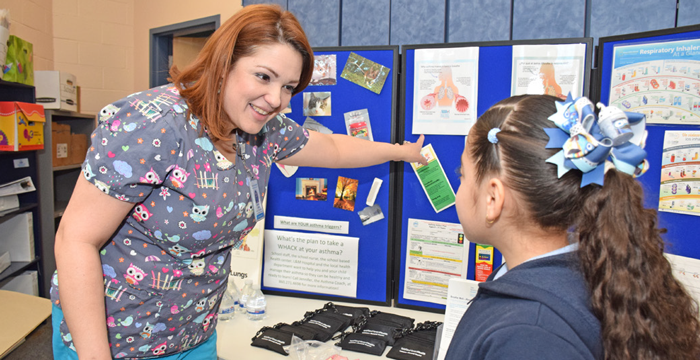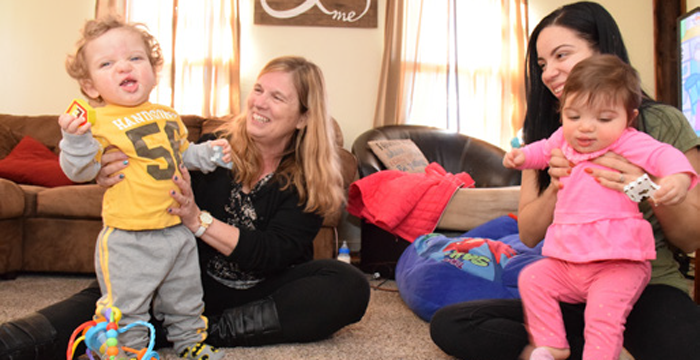-
Services
Featured Specialties
-
Locations
Location Type
-
Patients & Visitors
Lawrence + Memorial Hospital takes its role as a proactive player in the ongoing promotion of health and wellness to heart, offering an array of community programs, services and opportunities that engage people in the journey toward healthier living.
When the novel coronavirus pandemic (COVID-19) shifted social interactions globally, many of these local programs were forced to quickly adapt in efforts to continue safely supporting the community. Some of the many programs include classes that help parents prepare for the birth of a child, free screenings, and risk reduction counseling.
“During these months of the pandemic it has been a time of change and learning for both myself and the patients of the program. Everything had to change while still being able to support our patients,” said Jennifer Lemus, asthma self-management coach of Breathe Well-Respira Bien, a bilingual program that provides education and support to children and adults with asthma to manage their disease and break down barriers to their care.

The Car Seat Program, which educates caregivers on installation and safe use, now “meets” clients in the backseat of the client’s vehicle via Zoom where they are guided through the installation process. “The Zoom platform works best on our end as it allows us, as the meeting host, to share screenshots of manuals and other car seat related resources during the appointment. If a caregiver does not have access to Zoom, other virtual platforms are offered as options,” said Kelly Murphy, co-owner of The Safety Group.
Zoom, Skype, FaceTime and other technology applications have become familiar platforms in recent months as they have replaced in-person interactions. Additionally, the trusted phone, email and text messaging have been ways program coordinators have shared community resources with families. Wanda Santiago, community health worker and bilingual diabetes educator, said her clients “were grateful that I could still share resources to meet their needs, but they were more grateful that I was able to listen to their concerns and it is very satisfying to be there to provide that support.”
Laura Cotto, clinical supervisor of Nurturing Families, a grant funded program under the Office of Early Childhood said, “We created a Facebook page, @friendsofnurturingfamilies, to help share community resources, children’s activities and other important information families need to know during this time. We are looking forward to getting back to in-person visits, but we will probably continue to incorporate technology in new ways too.”
Nurturing Families provides parent support, education and resources to prenatal and new parents of children up to age six. In efforts to seamlessly meet the needs of its clients, the program recently rolled out a new mobile device application called Sparkler. The app helps parents track their child’s development with their home visitor and provides hundreds of activities for parents to do with their children.

The added challenge that COVID-19 presents is finding ways to safely interact in-person when necessary. Programs with a screening element understand that taking a closer look at how they move forward is imperative as studies have shown that COVID-19 can gravely impact those with preexisting conditions.
One such program is WISEWOMAN (Well Integrated Screening & Evaluation for WOMen Across the Nation), which focuses on reducing risk factors for cardiovascular diseases. The program provides uninsured or underinsured women with access to free diabetes, cholesterol and blood pressure screenings as well as risk reduction counseling. For women found at risk, the program provides health coaching, access to a dietician, gym memberships, membership to Weight Watchers and access to Medication Therapy Management by a licensed pharmacist—all free to the participant.
“It has been difficult because we are unable to perform community screenings due to COVID-19 and our providers were not providing in-person visits. We will have to adjust how we conduct our community screenings to limit possible exposure to COVID-19. We are considering conducting our risk assessments and risk reduction counseling over the phone to reduce risk,” said Lydia St. Hilaire, community health navigator of the CT Early Detection & Prevention Program.
While finding new ways to serve the community, all of these programs continue to enroll and virtually meet with clients. They are committed to the community’s health and wellness, and COVID-19 has strengthened that resolve. “We want families to know that they are not alone. We are still here for them even when we can’t be together,” said Cotto.